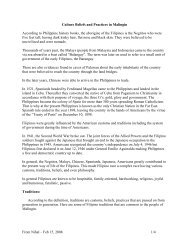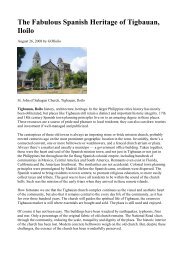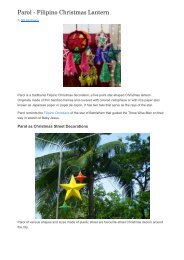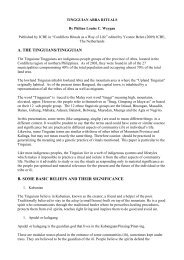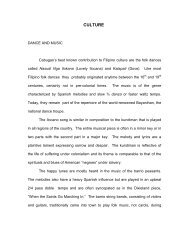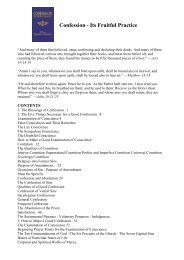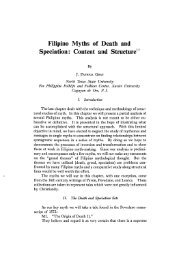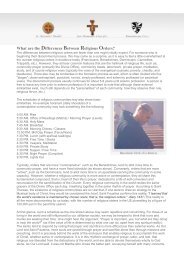Notes on Cebuano-Bisayan Ethnic Identity in the ... - AboutPhilippines
Notes on Cebuano-Bisayan Ethnic Identity in the ... - AboutPhilippines
Notes on Cebuano-Bisayan Ethnic Identity in the ... - AboutPhilippines
You also want an ePaper? Increase the reach of your titles
YUMPU automatically turns print PDFs into web optimized ePapers that Google loves.
Kobari/<str<strong>on</strong>g>Notes</str<strong>on</strong>g> <strong>on</strong> <strong>Cebuano</strong><strong>Bisayan</strong> <strong>Ethnic</strong> Indentity<br />
<strong>in</strong>tranati<strong>on</strong>al language which is a prerequisite for <strong>the</strong> access to educati<strong>on</strong> as well as<br />
<strong>in</strong>ternati<strong>on</strong>al language for global use. It is not overemphasized that <strong>the</strong>y now recognize<br />
English not as a col<strong>on</strong>ial/foreign language, but as <strong>on</strong>e of <strong>the</strong>ir languages 9 .<br />
With <strong>in</strong>equality <strong>in</strong> access to educati<strong>on</strong> <strong>in</strong> urban and rural areas and differences <strong>in</strong> quality<br />
of publicprivate educati<strong>on</strong>, most of parents prefer to send <strong>the</strong>ir children to prestigious<br />
schools and wish <strong>the</strong>m to acquire higher English abilities. Then, educati<strong>on</strong> is regarded as<br />
<strong>the</strong> most promis<strong>in</strong>g key to future socioec<strong>on</strong>omic success <strong>in</strong> society where majority of<br />
people have to face poverty and differences <strong>in</strong> <strong>the</strong>ir educati<strong>on</strong>al atta<strong>in</strong>ment create ano<strong>the</strong>r<br />
“we”“o<strong>the</strong>rs” dichotomy.<br />
44. Language Use of <strong>Cebuano</strong><strong>Bisayan</strong> Multil<strong>in</strong>gual Speakers<br />
In <strong>the</strong> previous secti<strong>on</strong>s, <strong>the</strong> formati<strong>on</strong> of “we”“o<strong>the</strong>rs” dichotomies <strong>in</strong><br />
Philipp<strong>in</strong>e society was briefly exam<strong>in</strong>ed. Then, how do <strong>Cebuano</strong><strong>Bisayan</strong> multil<strong>in</strong>gual<br />
speakers use <strong>the</strong>ir languages <strong>in</strong> particular c<strong>on</strong>texts? There are some examples of <strong>the</strong>ir<br />
language use below.<br />
As to actual language use, people follow certa<strong>in</strong> l<strong>in</strong>guistic norms which best suit<br />
various social c<strong>on</strong>texts. For example, English is required <strong>in</strong> educati<strong>on</strong>al doma<strong>in</strong>s and<br />
<strong>Cebuano</strong> is used am<strong>on</strong>g peers. The set of perceived l<strong>in</strong>guistic norms give <strong>in</strong>fluences <strong>on</strong><br />
<strong>the</strong>ir choice of languages (to some extent) and <strong>the</strong>y voluntarily choose <strong>the</strong> most<br />
appropriate language of <strong>the</strong>ir choice. But <strong>the</strong> l<strong>in</strong>guistic norms vary from <strong>on</strong>e<br />
communicative situati<strong>on</strong> to ano<strong>the</strong>r and guide <strong>the</strong>m to follow without def<strong>in</strong>ite compell<strong>in</strong>g<br />
power (except <strong>the</strong> educati<strong>on</strong>al, technological and <strong>in</strong>ternati<strong>on</strong>al bus<strong>in</strong>ess doma<strong>in</strong>s).<br />
Off course depend<strong>in</strong>g <strong>on</strong> <strong>the</strong>ir l<strong>in</strong>guistic abilities <strong>in</strong> languages, <strong>Cebuano</strong><strong>Bisayan</strong><br />
speakers select Filip<strong>in</strong>o (Tagalog), English and <strong>Cebuano</strong> <strong>in</strong> resp<strong>on</strong>se to social l<strong>in</strong>guistic<br />
norms <strong>in</strong> a communicative c<strong>on</strong>text. The use of <strong>Cebuano</strong> refers to a sense of bel<strong>on</strong>g<strong>in</strong>gness<br />
that “we” are <strong>the</strong> members of <strong>the</strong> same regi<strong>on</strong>al ethnic community, <strong>the</strong> use of Filip<strong>in</strong>o<br />
(Tagalog) appeals to pride of be<strong>in</strong>g Filip<strong>in</strong>os with a sense of nati<strong>on</strong>alism or some<br />
implicati<strong>on</strong>s to <strong>the</strong> center of <strong>the</strong> state, Manila. The eloquent use of English serves as an<br />
<strong>in</strong>dicator of be<strong>in</strong>g <strong>the</strong> “educado” or h<strong>in</strong>ts that <strong>the</strong> pers<strong>on</strong> has a relatively higher socioec<strong>on</strong>omic<br />
status.<br />
<strong>Cebuano</strong><strong>Bisayan</strong> speakers use <strong>Cebuano</strong> as a medium of daily c<strong>on</strong>versati<strong>on</strong>, but<br />
some college students prefer to communicate <strong>in</strong> English to <strong>in</strong>dicate that <strong>the</strong>y are learn<strong>in</strong>g<br />
<strong>in</strong> higher educati<strong>on</strong>al <strong>in</strong>stituti<strong>on</strong>s through <strong>the</strong> language use. They often mix <strong>Cebuano</strong> and<br />
English and switch <strong>the</strong> use of <strong>on</strong>e language to ano<strong>the</strong>r (codeswitch<strong>in</strong>g, sometimes with<br />
Tagalog and o<strong>the</strong>r vernaculars) <strong>in</strong> <strong>the</strong> middle of c<strong>on</strong>versati<strong>on</strong>. But when a high school<br />
student with relatively higher English command speaks English to <strong>the</strong>ir classmates, <strong>the</strong>y<br />
tease <strong>the</strong> student for his act of show<strong>in</strong>g off <strong>the</strong> mastery of English and irrelevance of<br />
language use <strong>in</strong> relati<strong>on</strong> to social l<strong>in</strong>guistic norms <strong>in</strong> <strong>the</strong> c<strong>on</strong>text. If <strong>on</strong>e uses English<br />
9 th Philipp<strong>in</strong>e L<strong>in</strong>guistics C<strong>on</strong>gress (2527 January 2006)<br />
Organized by <strong>the</strong> Department of L<strong>in</strong>guistics, University of <strong>the</strong> Philipp<strong>in</strong>es<br />
10



